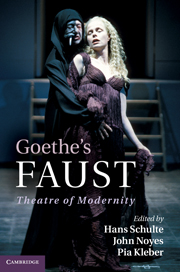Book contents
- Frontmatter
- Contents
- List of illustrations
- List of contributors
- Preface
- List of abbreviations
- Introduction
- PART I MODERNITY
- 1 Faust – today
- 2 Mephisto and the modernization of evil
- 3 Mephisto is the devil – or is he?
- 4 ‘Schwankende Gestalten’: virtuality in Goethe's Faust
- 5 Amnesia and anamnesis in Goethe's Faust
- 6 Magicians of modernity: Cagliostro and Saint-Simon in Goethe's Faust II
- 7 The blind Faust
- 8 From Faust to Harry Potter: discourses of the centaurs
- 9 Mistra and the Peloponnese in Goethe's Faust II
- 10 Goethe and the grotesque: the ‘Classical Walpurgis Night’
- 11 Re-defining classicism: antiquity in Faust II under the sign of the Medusa
- 12 Diabolical entrapment: Mephisto, the angels and the homoerotic in Goethe's Faust II
- PART II THEATRE
- Select bibliography
- Index
- References
8 - From Faust to Harry Potter: discourses of the centaurs
Published online by Cambridge University Press: 01 June 2011
- Frontmatter
- Contents
- List of illustrations
- List of contributors
- Preface
- List of abbreviations
- Introduction
- PART I MODERNITY
- 1 Faust – today
- 2 Mephisto and the modernization of evil
- 3 Mephisto is the devil – or is he?
- 4 ‘Schwankende Gestalten’: virtuality in Goethe's Faust
- 5 Amnesia and anamnesis in Goethe's Faust
- 6 Magicians of modernity: Cagliostro and Saint-Simon in Goethe's Faust II
- 7 The blind Faust
- 8 From Faust to Harry Potter: discourses of the centaurs
- 9 Mistra and the Peloponnese in Goethe's Faust II
- 10 Goethe and the grotesque: the ‘Classical Walpurgis Night’
- 11 Re-defining classicism: antiquity in Faust II under the sign of the Medusa
- 12 Diabolical entrapment: Mephisto, the angels and the homoerotic in Goethe's Faust II
- PART II THEATRE
- Select bibliography
- Index
- References
Summary
It may be called daring, or merely naïve, to relate Faust, the crown jewel of German-language literature, to Harry Potter, a series of seven children's books. The pressure to justify oneself that sets in when one takes Rowling's novels seriously as literature can also be seen in the qualifying titles of some of the publications that have so far appeared: Why Nabokov Would Have Liked H. P., or The Charm of H. P.; another subtitle is On the Trail of a Charming Bestseller. All these titles try to vindicate Rowling's novels as a relevant subject for academic analysis. Although a publicity machine of global dimensions may raise suspicions, popularity is not in itself a disqualification; it cannot change the text. Anyone able to ignore the media vortex and concentrate on the text will find sufficient quality to induce him to read further; and very quickly, Germanists will stumble across parallel motifs that practically invite the comparison with Faust.
For the young magician Harry Potter, who learns and practises sorcery at Hogwarts Boarding School, has more in common with the magician Faust than merely his first name, since German Heinrich is English Harry; more, too, than the academic milieu and the encounter with evil; and although Harry never concludes a pact with the devil, there exists a mysterious and life-threatening relationship between him and the Evil Lord.
- Type
- Chapter
- Information
- Goethe's FaustTheatre of Modernity, pp. 113 - 128Publisher: Cambridge University PressPrint publication year: 2011



